

Overview Symposium Govert Derix. Overview Symposium Richard Whitehurst. Overview Symposium Philippe Ailleris. Reforesting, Rewilding, and Re-thinking Civilization. [6 Key Questions in] Whole Systems Thinking - Age of Awareness - Medium. The whole-systems understanding of the world acknowledges that a whole is always more than the simple sum of its parts, paying attention to the diversity of elements, the quality of interactions and relationships, and the dynamic patterns of behaviour that often lead to unpredictable and surprising innovations and adaptations.
![[6 Key Questions in] Whole Systems Thinking - Age of Awareness - Medium](http://cdn.pearltrees.com/s/pic/th/questions-thinking-awareness-202782040)
Many of the interrelated problems we face, as change agents in the transition towards a more sustainable human presence on Earth, have their root cause in a way of thinking that has not paid enough attention to whole systems and their dynamic interconnectedness, dynamic relationships and context. This systems definition could be applied to a molecule, a cell, a human being, a community or the planet. In many ways a system is less a ‘thing’ than a pattern of relationships and interactions — a pattern of organization of constituting elements. The Greek root of the word system is ‘synhistanai’ and literally means ‘to place together’. Transtorno de dependência de tela é real e pode danificar o cérebro do seu filho. Da próxima vez que você sair de casa e se aventurar em um lugar público, tire um minuto para dar uma olhada.

Se estivermos vivendo no mesmo planeta, não demorará muito para você ver uma criança com os olhos colados em uma tela quase tão grande quanto o rosto dela. Embora tenhamos testemunhado alguns incríveis avanços tecnológicos no século 21, os pais perceberam que entregar a uma criança o seu smartphone ou tablet é uma solução conveniente para tédio ou acessos de birra. Árvores são "nossa arma mais poderosa na luta contra a mudança climática", diz cientista - Portal Neo Mondo. Millennium Ecosystem Assessment. Document. Document. Document. Document. Document. Document. Natural capital accounting taking stock IR16 en. Millennium Ecosystem Assessment. Capitalism Killed Our Climate Momentum, Not “Human Nature” The skyline of Manhattan at sunset in New York, May 23, 2018.
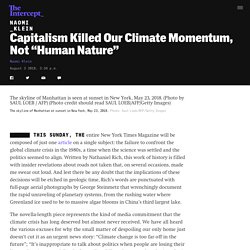
Photo: Saul Loeb/AFP/Getty Images This Sunday, the entire New York Times Magazine will be composed of just one article on a single subject: the failure to confront the global climate crisis in the 1980s, a time when the science was settled and the politics seemed to align. Written by Nathaniel Rich, this work of history is filled with insider revelations about roads not taken that, on several occasions, made me swear out loud. And lest there be any doubt that the implications of these decisions will be etched in geologic time, Rich’s words are punctuated with full-page aerial photographs by George Steinmetz that wrenchingly document the rapid unraveling of planetary systems, from the rushing water where Greenland ice used to be to massive algae blooms in China’s third largest lake.
The novella-length piece represents the kind of media commitment that the climate crisis has long deserved but almost never received. But we know. James Watson. Fênix Amazônico.
Restoring Deserts. Futuro Climático da Amazônia. Geoengenharia Absurda. Global commons - Wikipedia. Global commons is a term typically used to describe international, supranational, and global resource domains in which common-pool resources are found.
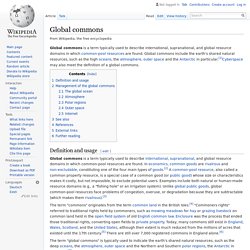
Global commons include the earth's shared natural resources, such as the high oceans, the atmosphere, outer space and the Antarctic in particular.[1]Cyberspace may also meet the definition of a global commons. Definition and usage[edit] The term "commons" originates from the term common land in the British Isles.[4] "Commoners rights" referred to traditional rights held by commoners, such as mowing meadows for hay or grazing livestock on common land held in the open field system of old English common law. Enclosure was the process that ended those traditional rights, converting open fields to private property.
Global Environment Facility. The GEF works to safeguard the planetary operating systems which make civilisation possible.
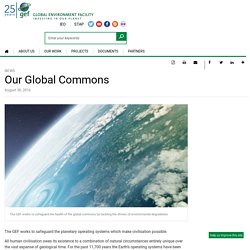
All human civilisation owes its existence to a combination of natural circumstances entirely unique over the vast expanse of geological time. For the past 11,700 years the Earth's operating systems have been unprecedentedly, even freakishly, stable and benign, allowing our distant ancestors – fully modern humans who until then had been roaming the land for over a hundred millennia – to settle down and develop first agriculture, then towns and cities and, finally, the modern world. But now evidence is increasing that we are, ourselves, bringing these conditions to an end. The Global Commons: tragedy or opportunity?
Our Global Commons: An International Dialogue. Assessing the pressures on the global environment and disrupting the systems that drive them An International Dialogue Our world is reaching the limits of what it can provide sustainably.
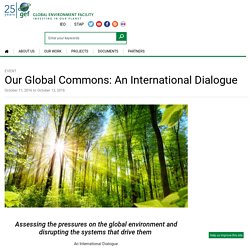
All life on Earth depends on clean air and water, biodiversity and a stable climate. Global Environment Facility. Natural Capital Toolkit - WBCSD & Natural Capital Coalition. Natural Capital Toolkit - WBCSD & Natural Capital Coalition. Caixa de ferramentas de mensuração e valoração de capital natural - Página22. Desde a divulgação da Avaliação Ecossistêmica do Milênio, em 2005, e principalmente do The Economics of Ecosystems and Biodiversity, em 2010, o conceito de serviços ecossistêmicos – benefícios que as pessoas obtêm dos ecossistemas ou contribuições diretas ou indiretas dos ecossistemas para o bem-estar humano – ultrapassou as fronteiras da academia e tem ganhando outros setores da sociedade como um meio para uma gestão ambiental mais estratégica, ou também conhecido como gestão do capital natural – estoque limitado de ativos ambientais ou recursos providos pela natureza (renováveis e não renováveis) que se combinam produzindo um valioso fluxo de benefícios para a sociedade.

Naquele momento, destacava-se dentre os diversos desafios para a incorporação da biodiversidade e serviços ecossistêmicos na gestão empresarial, a necessidade do desenvolvimento de “programas internacionais que promovam a medição e avaliação dos serviços ecossistêmicos”. New movement for the global commons. Global Awareness Through Science and Art. GEF-IUCN International Dialogue on the Global Commons and Science Day - 2016. The Economics of Ecosystems and Biodiversity - TEEB.
Pavan Sukhdev. Of Markets and Failures| Jan, 2015 The need for a right energy strategy as we enter the new year.
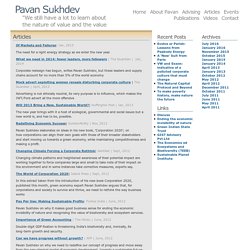
What we need in 2014: fewer leaders, more followers | The Guardian | Jan, 2014 Corporate redesign has begun, writes Pavan Sukhdev, but these leaders and supply chains account for no more than 5% of the world economy. Pavan Sukhdev.